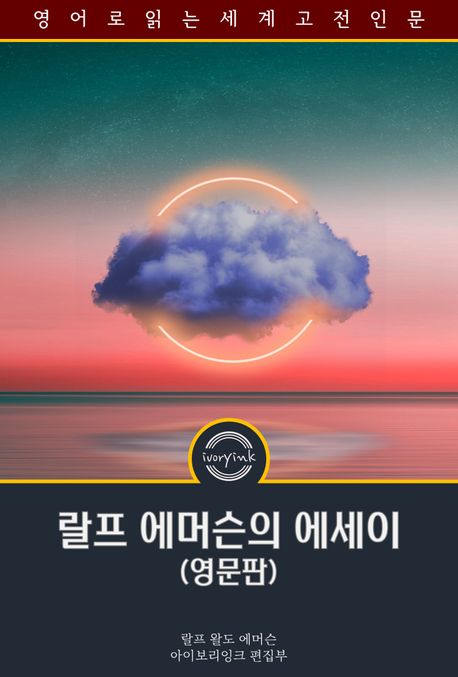랄프 에머슨의 에세이 / Essays by Ralph Waldo Emerson (영문판)
2025년 09월 24일 출간
- eBook 상품 정보
- 파일 정보 ePUB (0.73MB)
- ISBN 9791139827545
- 지원기기 교보eBook App, PC e서재, 리더기, 웹뷰어
-
교보eBook App
듣기(TTS) 가능
TTS 란?텍스트를 음성으로 읽어주는 기술입니다.
- 전자책의 편집 상태에 따라 본문의 흐름과 다르게 텍스트를 읽을 수 있습니다.
- 이미지 형태로 제작된 전자책 (예 : ZIP 파일)은 TTS 기능을 지원하지 않습니다.

이 상품은 배송되지 않는 디지털 상품이며,
교보eBook앱이나 웹뷰어에서 바로 이용가능합니다.
작품소개
이 상품이 속한 분야
'Essays by Ralph Waldo Emerson (영문판)'은 미국의 대표적인 사상가 랄프 왈도 에머슨의 주요 에세이를 영어 원문으로 담고 있는 작품집입니다. 자연, 자기신뢰, 우정, 정신 등 다양한 주제에 대한 에머슨의 깊은 통찰과 철학적 사유를 느낄 수 있으며, 그의 문장을 통해 19세기 미국 문학과 사상의 정수를 경험할 수 있습니다. 영문판으로 읽음으로써 에머슨 특유의 언어 유희와 표현, 철학적 깊이를 온전히 접할 수 있어 영어 학습자 및 원문 독자들에게 특히 추천됩니다.
목차
LIFE OF EMERSON
CRITICAL OPINIONS OF EMERSON AND HIS WRITINGS.
THE AMERICAN SCHOLAR.
COMPENSATION.
SELF-RELIANCE
FRIENDSHIP.
HEROISM
MANNERS
GIFTS
NATURE
SHAKSPEARE; OR, THE POET
PRUDENCE.
CIRCLES.
copyrights
(참고) 분량: 약 51 만자
This address was delivered at Cambridge in 1837, before the Harvard Chapter of the Phi Beta Kappa Society, a college fraternity composed of the first twenty-five men in each graduating class. The society has annual meetings, which have been the occasion for addresses from the most distinguished scholars and thinkers of the day.
I greet you on the recommencement of our literary year. Our anniversary is one of hope, and, perhaps, not enough of labor. We do not meet for games of strength or skill, for the recitation of histories, tragedies, and odes, like the ancient Greeks; for parliaments of love and poesy, like the Troubadours; nor for the advancement of science, like our co-temporaries in the British and European capitals. Thus far, our holiday has been simply a friendly sign of the survival of the love of letters amongst a people too busy to give to letters any more. As such it is precious as the sign of an indestructible instinct. Perhaps the time is already come when it ought to be, and will be, something else; when the sluggard intellect of this continent will look from under its iron lids and fill the postponed expectation of the world with something better than the exertions of mechanical skill. Our day of dependence, our long apprenticeship to the learning of other lands, draws to a close. The millions that around us are rushing into life cannot always be fed on the sere remains of foreign harvests. Events, actions arise that must be sung, that will sing themselves. Who can doubt that poetry will revive and lead in a new age, as the star in the constellation Harp, which now flames in our zenith, astronomers announce, shall one day be the pole-star for a thousand years?
In the light of this hope I accept the topic which not only usage but the nature of our association seem to prescribe to this day,—the . Year by year we come up hither to read one more chapter of his biography. Let us inquire what new lights, new events, and more days have thrown on his character, his duties, and his hopes.
It is one of those fables which out of an unknown antiquity convey an unlooked-for wisdom, that the gods, in the beginning, divided Man into men, that he might be more helpful to himself; just as the hand was divided into fingers, the better to answer its end.
The old fable covers a doctrine ever new and sublime; that there is One Man,—present to all particular men only partially, or through one faculty; and that you must take the whole society to find the whole man. Man is not a farmer, or a professor, or an engineer, but he is all. Man is priest, and scholar, and statesman, and producer, and soldier. In the divided or social state these functions are parceled out to individuals, each of whom aims to do his stint of the joint work, whilst each other performs his. The fable implies that the individual, to possess himself, must sometimes return from his own labor to embrace all the other laborers. But, unfortunately, this original unit, this fountain of power, has been so distributed to multitudes, has been so minutely subdivided and peddled out, that it is spilled into drops, and cannot be gathered. The state of society is one in which the members have suffered amputation from the trunk and strut about so many walking monsters,—a good finger, a neck, a stomach, an elbow, but never a man.
Man is thus metamorphosed into a thing, into many things. The planter, who is Man sent out into the field to gather food, is seldom cheered by any idea of the true dignity of his ministry. He sees his bushel and his cart, and nothing beyond, and sinks into the farmer, instead of Man on the farm. The tradesman scarcely ever gives an ideal worth to his work, but is ridden by the routine of his craft, and the soul is subject to dollars. The priest becomes a form; the attorney a statute-book; the mechanic a machine; the sailor a rope of the ship.
In this distribution of functions the scholar is the delegated intellect. In the right state he is Man Thinking. In the degenerate state, when the victim of society, he tends to become a mere thinker, or, still worse, the parrot of other men’s thinking.
In this view of him, as Man Thinking, the whole theory of his office is contained. Him Nature solicits with all her placid, all her monitory pictures. Him the past instructs. Him the future invites. Is not indeed every man a student, and do not all things exist for the student’s behoof? And, finally, is not the true scholar the only true master? But as the old oracle said, "All things have two handles: Beware of the wrong one." In life, too often, the scholar errs with mankind and forfeits his privilege. Let us see him in his school, and consider him in reference to the main influences he receives.
I. The first in time and the first in importance of the influences upon the mind is that of nature. Every day, the sun; and, after sunset, Night and her stars. Ever the winds blow; ever the grass grows. Every day, men and women, conversing, beholding and beholden. The scholar must needs stand wistful and admiring before this great spectacle. He must settle its value in his mind. What is nature to him? There is never a beginning, there is never an end, to the inexplicable continuity of this web of God, but always circular power returning into itself. Therein it resembles his own spirit, whose beginning, whose ending, he never can find,—so entire, so boundless. Far too as her splendors shine, system on system shooting like rays, upward, downward, without center, without circumference,—in the mass and in the particle, Nature hastens to render account of herself to the mind. Classification begins. To the young mind everything is individual, stands by itself. By and by it finds how to join two things and see in them one nature; then three, then three thousand; and so, tyrannized over by its own unifying instinct, it goes on tying things together, diminishing anomalies, discovering roots running under ground whereby contrary and remote things cohere and flower out from one stem. It presently learns that since the dawn of history there has been a constant accumulation and classifying of facts. But what is classification but the perceiving that these objects are not chaotic, and are not foreign, but have a law which is also a law of the human mind? The astronomer discovers that geometry, a pure abstraction of the human mind, is the measure of planetary motion. The chemist finds proportions and intelligible method throughout matter; and science is nothing but the finding of analogy, identity, in the most remote parts. The ambitious soul sits down before each refractory fact; one after another reduces all strange constitutions, all new powers, to their class and their law, and goes on forever to animate the last fiber of organization, the outskirts of nature, by insight.
Thus to him, to this school-boy under the bending dome of day, is suggested that he and it proceed from one Root; one is leaf and one is flower; relation, sympathy, stirring in every vein. And what is that root? Is not that the soul of his soul?—A thought too bold?—A dream too wild? Yet when this spiritual light shall have revealed the law of more earthly natures,—when he has learned to worship the soul, and to see that the natural philosophy that now is, is only the first gropings of its gigantic hand,—he shall look forward to an ever-expanding knowledge as to a becoming creator. He shall see that nature is the opposite of the soul, answering to it part for part. One is seal and one is print. Its beauty is the beauty of his own mind. Its laws are the laws of his own mind. Nature then becomes to him the measure of his attainments. So much of nature as he is ignorant of, so much of his own mind does he not yet possess. And, in fine, the ancient precept, "Know thyself," and the modern precept, "Study nature," become at last one maxim.
II. The next great influence into the spirit of the scholar is the mind of the Past,—in whatever form, whether of literature, of art, of institutions, that mind is inscribed. Books are the best type of the influence of the past, and perhaps we shall get at the truth,—learn the amount of this influence more conveniently,—by considering their value alone.
The theory of books is noble. The scholar of the first age received into him the world around; brooded thereon; gave it the new arrangement of his own mind, and uttered it again. It came into him life; it went out from him truth. It came to him short-lived actions; it went out from him immortal thoughts. It came to him business; it went from him poetry. It was dead fact; now, it is quick thought. It can stand, and it can go. It now endures, it now flies, it now inspires. Precisely in proportion to the depth of mind from which it issued, so high does it soar, so long does it sing.
인물정보
저자(글) 랄프 왈도 에머슨
랄프 왈도 에머슨(Ralph Waldo Emerson, 1803~1882)은 미국의 대표적인 사상가이자 수필가, 시인입니다. '자기신뢰'와 '초월주의' 철학을 중심으로, 개인의 자유와 자연, 인간 정신의 무한한 가능성에 대한 깊은 통찰을 남겼습니다. 그의 저작들은 미국 문학사와 사상사에 지대한 영향을 미쳤으며, 지금도 많은 이들에게 영감과 사색의 원천이 되고 있습니다.
이 상품의 총서
Klover리뷰 (0)
- - e교환권은 적립일로부터 180일 동안 사용 가능합니다.
- - 리워드는 5,000원 이상 eBook, 오디오북, 동영상에 한해 다운로드 완료 후 리뷰 작성 시 익일 제공됩니다. (2024년 9월 30일부터 적용)
- - 리워드는 한 상품에 최초 1회만 제공됩니다.
- - sam 이용권 구매 상품 / 선물받은 eBook은 리워드 대상에서 제외됩니다.
- 도서나 타인에 대해 근거 없이 비방을 하거나 타인의 명예를 훼손할 수 있는 리뷰
- 도서와 무관한 내용의 리뷰
- 인신공격이나 욕설, 비속어, 혐오 발언이 개재된 리뷰
- 의성어나 의태어 등 내용의 의미가 없는 리뷰
구매 후 리뷰 작성 시, e교환권 100원 적립
문장수집
- 구매 후 90일 이내에 문장 수집 등록 시 e교환권 100원을 적립해 드립니다.
- e교환권은 적립일로부터 180일 동안 사용 가능합니다.
- 리워드는 5,000원 이상 eBook에 한해 다운로드 완료 후 문장수집 등록 시 제공됩니다. (2024년 9월 30일부터 적용)
- 리워드는 한 상품에 최초 1회만 제공됩니다.
- sam 이용권 구매 상품 / 선물받은 eBook / 오디오북·동영상 상품/주문취소/환불 시 리워드 대상에서 제외됩니다.
구매 후 문장수집 작성 시, e교환권 100원 적립
신규가입 혜택 지급이 완료 되었습니다.
바로 사용 가능한 교보e캐시 1,000원 (유효기간 7일)
지금 바로 교보eBook의 다양한 콘텐츠를 이용해 보세요!








